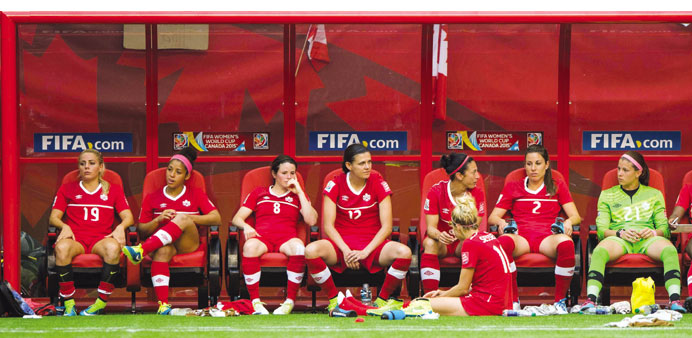Canada players sit on their bench after losing to England 1-2 in the quarter-finals at the FIFA Women’s World Cup at BC Place Stadium in Vancouver, Canada. (AFP)
Reuters/Vancouver
Canada awoke with a Women’s World Cup hangover on Sunday, while England supporters prepared to party on as their team headed to Edmonton and a showdown with Japan for a spot in the championship final.
The semi-final clash between the defending champions and surprise package England scheduled for tomorrow was timed to be a July 1 Canada Day celebration with the host team providing the sporting fireworks.
But England threw a bit of cold water on the national holiday plans on Saturday, exploding for two goals in three minutes and then holding on for a 2-1 win that ended Canada’s World Cup dreams. While Canadian supporters come to grips with their disappointment, organisers will be bracing for the fallout from the host team’s exit, with record attendance and viewership figures likely to dip as the tournament heads to a July 5 finish in Vancouver.
Certainly the crowd in Edmonton will be well below the capacity 56,000 that was expected for a semi featuring the host nation but the US remain a big draw and close to 50,000 are likely to turn up in Montreal today when the Americans take on top ranked Germany in the other semi-final.
For Canada, however, the World Cup is over and the post-mortems already underway. In the raw moments following Canada’s defeat, a British reporter attempted to bait Canadian team coach John Herdman, asking if he regretted not taking the England job that was rumoured to be on offer to him 18 months earlier. The Englishman, who often talks with the passion and pride of a born-and-bred Canadian, identifying himself with the gritty, take-no-prisoners style of play that has become the country’s trademark on the ice hockey rinks, bit his lip and fired back.
“No chance. You ask the players where they would rather live,” snapped Herdman.
“This is a real football country, women’s football country. I don’t care what the result is, those fans showed everyone around the world how to support the women’s game. You nearly got us there, I was about to go off on one but I’m not. I’ll tell you where I will be tomorrow, I will be walking along that sea front with my wife and my kids looking ahead to the future.”
That future includes a programme very much in transition, as some national team stalwarts make way for new blood. Christine Sinclair, Canada’s all-time leading scorer and cornerstone of the national team since she was 16, is now 32 while her attacking partner Melissa Tancredi is 33.
A lack of pace and finishing touch was glaring during the World Cup as Canada scored just four times in five games and only three in the run of play.
“There is a new DNA coming through, there is a new breed of footballer that we are bringing through,” said Herdman, who has a contract with the Canadian Soccer Association through 2020.
“It was a transitional team and we knew that but we have no excuse. We came here to win a World Cup (and) because it was on home soil we weren’t going to hide that we are a transitional team. We were here to do a job. We wanted to make our country proud and I think we did that.
“You can see the team is going to move through a transitional phase. Stick with us, we will be back and we’ll be back fighting strong, we will learn from this.”

